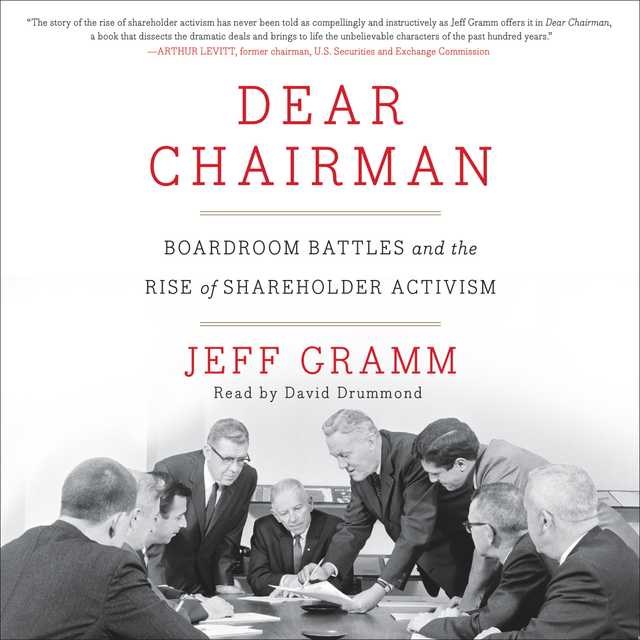Dear Chairman Audiobook Summary
A sharp and illuminating history of one of capitalism’s longest running tensions–the conflicts of interest among public company directors, managers, and shareholders–told through entertaining case studies and original letters from some of our most legendary and controversial investors and activists.
Recent disputes between shareholders and major corporations, including Apple and DuPont, have made headlines. But the struggle between management and those who own stock has been going on for nearly a century. Mixing never-before-published and rare, original letters from Wall Street icons–including Benjamin Graham, Warren Buffett, Ross Perot, Carl Icahn, and Daniel Loeb–with masterful scholarship and professional insight, Dear Chairman traces the rise in shareholder activism from the 1920s to today, and provides an invaluable and unprecedented perspective on what it means to be a public company, including how they work and who is really in control.
Jeff Gramm analyzes different eras and pivotal boardroom battles from the last century to understand the factors that have caused shareholders and management to collide. Throughout, he uses the letters to show how investors interact with directors and managers, how they think about their target companies, and how they plan to profit. Each is a fascinating example of capitalism at work told through the voices of its most colorful, influential participants.
A hedge fund manager and an adjunct professor at Columbia Business School, Gramm has spent as much time evaluating CEOs and directors as he has trying to understand and value businesses. He has seen public companies that are poorly run, and some that willfully disenfranchise their shareholders. While he pays tribute to the ingenuity of public company investors, Gramm also exposes examples of shareholder activism at its very worst, when hedge funds engineer stealthy land-grabs at the expense of a company’s long term prospects. Ultimately, he provides a thorough, much-needed understanding of the public company/shareholder relationship for investors, managers, and everyone concerned with the future of capitalism.
Other Top Audiobooks
Dear Chairman Audiobook Narrator
David Drummond is the narrator of Dear Chairman audiobook that was written by Jeff Gramm
Jeff Gramm runs a hedge fund and has served on several public company boards of directors. He is an adjunct professor at Columbia Business School, where he teaches value investing. Jeff lives in Brooklyn, New York, with his wife and two children.
About the Author(s) of Dear Chairman
Jeff Gramm is the author of Dear Chairman
More From the Same
- Publisher : HarperAudio
- Abraham
- American Gods [TV Tie-In]
- Dead Ringer
- House of Sand and Fog
- Prey
Dear Chairman Full Details
| Narrator | David Drummond |
| Length | 10 hours 13 minutes |
| Author | Jeff Gramm |
| Category | |
| Publisher | HarperAudio |
| Release date | February 23, 2016 |
| ISBN | 9780062445049 |
Subjects
The publisher of the Dear Chairman is HarperAudio. includes the following subjects: The BISAC Subject Code is Business & Economics, Business Communication, General
Additional info
The publisher of the Dear Chairman is HarperAudio. The imprint is HarperAudio. It is supplied by HarperAudio. The ISBN-13 is 9780062445049.
Global Availability
This book is only available in the United States.
Goodreads Reviews
Justas
August 17, 2020
"If private equity does one thing well, it's governance. It's their money, they are not afraid to ask tough questions and to really understand the business and make the needed changes. Boards are notorious for waiting too long to rid of bad people. It's hard to pull the trigger on bad-performing CEOs.""Being smart about risk doesn't mean buying the best assets and ignoring the bad ones.""...CEO then secures his position by making sure his second in command is even dumber than he is, the corporate governing class evolves into a vast idiocracy."
Grahamshircore
July 16, 2017
I thought at first that the additional commentary from Jeff which digresses quite a bit from each case study was a pain but I quickly realised that it added massively to my enjoyment and the usefulness of the book rather than detracting from it.
Jack
June 02, 2020
This is great, would highly recommend to those who want to understand public company ownership. Gramm isn't as sharp as Matt Levine (Bloomberg) but there are some great insights here. I really enjoyed the history, Gramm's commentary, and the weird respect for good persuasive writing among the upper crust of financiers. This is a WAY better way to understand the shareholder ownership model than a classic McKinsey textbook or a university class. Useful reading for any investor I think.
Library of
October 14, 2021
Well-written and highly interesting book. Below is my notes. Dear Chairman is about shareholder activism in the United States over the past century. The book is written by Columbia professor and fund manager Jeff Gramm and consists of eight studies based on investor letters, newspaper clippings and interviews. According to Gramm, the starting point for shareholder activism was Benjamin Graham’s collision with the Northern Pipeline in 1926. As America then became richer and shareholding more widespread, more and more disputes over corporate control broke out.STARTS OUT IN THE 1920S. In 1926, Benjamin Graham discovered that the profitable Northern Pipeline (NP) had $90/share in bonds while the stock price was $65. NP held its AGM in Oil City, Pennsylvania, far from the company’s headquarters – probably so that the board and management would get work undisturbed. Graham went there but had forgotten to pre-register his case and had to go home unheard. After working with major shareholders and after several rounds with the board, Graham got hold of two of five board positions. He then got the company to distribute the excess capital to the shareholders.THE SALAD-OIL SCANDAL IN THE 1960S. Buffett started his partnership in 1956, and experimented in the beginning with everything from activism to short selling and pair trades. A classic story is that of American Express’s (AE) salad-oil scandal that erupted in 1963. The share price fell sharply and Buffett realized that the scandal did not damage AE’s highly profitable core business and invested 40% of the partnership’s capital in the company. He then began to persuade management and the board not to fight against the compensation of the swindlers. Legally, AE did not have to pay any compensation and shareholders loudly began to complain that a payment would still take place. Buffett realized that a lack of compensation could damage AE’s good brand and customer confidence and in the long run overthrow the company. If they took a big “one off”, AE would quickly be on the track again – which got to be the case. THE RANSOM LETTERS OF THE 1980S. The 1980s were the decade of “corporate raiders” and the big names on Wall Street were Carl Icahn, Michael Milken and T. Boone Pickens. “Bear hug letters” (an unwelcome but generous takeover bid), greenmail (targeted buyouts by individual shareholders), hostile takeovers (takeover attempts without board / management approval) and poison pills (a protection against hostile takeovers – often via the articles of association) were new words used extensively in the financial press. The activist investments of the decade were to a large degree made possible by cheap capital from Michael Milken. He was the “father of junk bonds” (high-yield bonds with little security) and through this built up a fortune. After a too long time in the grey zone, the happy 1980s resulted in 10 years in prison and a $600m fine for Milken. In the end, however, he came out after only two years. THE TOWN-HANGINGS OF THE 2000S. In the late 1990s and early 2000s, hedge fund manager Daniel Loeb introduced a new type of activism – public shaming. Loeb’s approach was to take a position of power in problem companies and replace inefficient management to reverse the negative development. To get the attention of key people, he sent out open letters in which he clearly expressed how management exploited the shareholders through passivity, dishonesty, or laziness. The open letters contained everything from personal attacks to curse words and proved to be highly effective. Loeb had found the key point of key people – if there is one thing CEOs and board members care about, it is their reputation.”Sometimes a town hanging is useful to establish my reputation for future dealings with unscrupulous CEOs”– Daniel LoebACTIVISM IS NOT ALWAYS A GOOD THING. Studies have shown that activism is generally value-creating. However, not all outcomes will be good. Gramm takes up the example of BKF Capital, where activists ran a marginally profitable fund company into non-existence. The activists felt that earnings were burdened by unusually high staff costs and saw potential for quick gains if wage levels were trimmed. But when wages were reduced, the staff disappeared and with the staff, the investors disappeared. The fund company’s AUM fell rapidly and after only a few years the business was wound up.ACTIVISM AS AN ASSET CLASS. According to Gramm, activism entered the institutional world in the late 1980s after GM, through greenmail, bought out major owner Ross Perot. The purchase took place at a large premium and Perot’s billion profit was financed at the expense of other shareholders. Thereafter, the major institutional shareholders increasingly began to side with the activists. It was also in connection with this that greenmail was banned. Nowadays, even normally passive institutions are open to follow successful activists.
Héctor
June 26, 2022
The best book yet on the subject of Activist Investing.
Tomas
September 26, 2019
"Dear Chairman" is a great historical summary of shareholders activism, iliustrated by real case studies from different decades. I really liked that in the end of the book author provides original copies of shareholders letters to company chairman or CEO. Too my mind this book can interesting and most useful only for experienced investors.
Trung
December 06, 2016
Overall, it's a enjoyable read about 8 detailed cases of shareholder activism, which include: Benjamin Graham, Warren Buffett, Dan Loeb, Carl Icahn.
Bruno
February 08, 2021
A great book with great stories and great business lessons.The author cherry-picked the stories not to broader or maximize the lessons, but the general view of the reader by exemplifying: (i) how activism investing evolved over time, (ii) the many different approaches and (iii) the two possible outcomes.I would love to find cases picked by the relevance and deep of the business lessons withdrawn from them.The story starts with a tale of Benjamin Graham, the father of value investing, trying to convince the management of Northern Pipeline of the obvious: the holding of financial securities on the balance sheet was tax inefficient, thus the company should pay in dividends most of its cash. Back then, even a titan of investing, such as Graham, didn’t have his tool-box of thought the human biases so commonly talked about today. Management was unwilling to distribute the cash because it would leave them with a smaller and less capitalized company. There was an obvious conflict of interest between management and shareholders. For most investors nowadays, this is a no-brainer, what shows the great lengths we’ve come to have the corporate governance common nowadays. It also reminds us that some behaviors which we accept right now as “just the ways things are” and “every company does/is like this” will likely be unthinkable one day. Investors should never be afraid to ask questions and never accept “in all the other companies, things are like this” as an answer.The book goes on with the proxy tiers of the of the 50’s, Warren Buffet, the corporate riders of the 80’s and, finally, the activist investors of the XXI century.My take-ways:- There is no right or wrong structure or source of funding for activism investing: there were successful activist investors using holding companies, hedge-fund, distress debt, etc;- Though activist investors are notorious for news worth fight-to-the-death-in-a-cage, a la Bill Ackman and Herbalife, it is better to go through out your career building alliances, a la Buffet style, instead of making enemies, coincident or not, history shows that guys who spend their activist investors’ careers putting up a good fight end up somehow being berried;- The first thing to do is a change in management: the book is composed of eight cases of companies in distinct situations, in diverse sectors, through the course of one hundred years, in none of them investors managed to convince the management to be on-board with changes;- Activism investing is a doubled-edged sword: it can unlock great value or destroy the company.
Jessica
March 07, 2021
This is an incredibly well-written book. It mostly reads like an investing history book for a popular audience, although occasionally the author uses investing jargon without explaining it. I can't fault him for just that, though. His research and knowledge are impressive. His acknowledgements and criticism of explicit and implicit sexism in one chapter increases his credibility. And he is often entertaining and even funny, when appropriate. I really enjoyed reading the book, even the parts that didn't pertain to my own research purposes, and found myself eager to get back to it whenever I had to step away. He achieves exactly what he set out to do: to “understand the rise of the shareholder” (x), “explain how shareholder activism works” (xiii) to facilitate more informed investors (199), and evaluate “the wisdom of particular campaigns” (xv). He also strives to make it clear that there is no simple "checklist" of attributes or circumstances that makes for an ideal board of directors, as independence is a "knotty" and nuanced notion, and there are often contradictory goals for such a body anyway. Consequently, he posits the ideal situation as one in which all relevant parties, including shareholders themselves, are attentive and involved.
Sam
March 09, 2019
This is a well written examination of the history of investor activism in America through the letters written by shareholders to boards encouraging them to change policy or management. I am definitely not Gramm's intended audience and I only read it to get a better understanding of the way wealthy i
Tauri
July 08, 2022
It was funny to listen that a century back they fought for shareholder rights getting part of the profits as "Aunt Mary's" savings. Well, no Aunt Marys as shareholders any more today, only the rich getting richer in US. But the book was a good wake up call: if at any time You are leading a company that has shareholders and their value is too low compared to the real value to the company, it will activate some professional vultures that have a lot of tricks to manipulate and lie to get the company assets sold off. Before reading the book I thought that a business with spare money is a good organization, but those vultures see this "spare" excess money as a resource to be grabbed away (and to invest in somewhere else by their own choosing). So in future I will make an effort to hold the share value at least as high as the real value - so I'm not a shiny target for any capital vulture.
Lee
July 23, 2018
Gramm takes a dry subject, shareholder activistism, and weaves stories that show readers why what he and other activist investors do matters. He does so by narrating a handful of boardroom battles with bad management tangling with concerned shareholders, all the while explaining what stock owners should do (owning stock is an active act, he claims, not a passive one). Some of these stories are ripe for film adaptations, like the daughter of the founder of a company who marries the man who becomes the CEO. As her marriage falls apart, she realizes her husband is running the company as a club for his friends and so she takes him on, defenestrating his clique and restoring the health of the company her father founded by selling it off. Even if you're not business-minded, consider this for beach reading. Makes for a surprisingly fascinating step into the C-Suite.
Jon
November 23, 2017
I did enjoy the stories ... I find the world of publicly held companies and their management extremely interesting... I received a complimentary copy of this book from the author indirectly. He was scheduled as a keynote speaker at a conference I attended this year outside of Chicago. A family emergency caused him unable to speak, and as a way to make it up to attendees he saw that each received a copy of his book. After reading the book, which I enjoyed and appreciated, I can't help but think how great his presentation would have been.... I found the boardroom battles and shareholder activism stories and commentary valuable and has given me some historical background in which to relate to the current and future investing events I will certainly witness....
Tag
March 02, 2019
Interesting book touching on the brief history of shareholder activism - from Benjamin Graham, to the “Proxyteers”, to the hedge fund managers with some appalling examples of poor corporate governance. The book publishes actual letters and used 8 real cases to provide valuable insight on the different reasons for shareholder activism (inefficient capital allocation, misalignment of incentives, pure incompetence). The book ends with an example on how shareholder activism failed to produce a good outcome for shareholders (BKF capital). It becomes clear that the entrenchment of CEOs and their boards is not just a problem of the past. Overall a good business book to read leisurely.
Brian
February 17, 2019
I picked this one up at the Berkshire Hathaway conference last year. It was excellent and highly recommended for anyone in the investment or banking worlds. The storytelling is excellent and traces a path from Benjamin Graham to Carl Icahn today and the inventions, successes and failures along the way of those who ensure that publicly traded companies actually do the right thing for their owners. The only reason I'm giving this four instead of five shares is that sprinkled, seemingly at random, in the chapters are a lot of good insights about corporate governance today. I didn't see the logic to how the insights were organized and would have a hard time going back to find them later.
Dave S
March 03, 2022
Published in 2015, “Dear Chairman” is one of the few finance books dedicated to the (history of) shareholder activism. It has not occurred to me that Ben Graham and Warren Buffet could be considered as activists. The chapters on Karla Scherer and the BKF Capital were beyond fascinating. The one about Dan Loeb was very informative about the rise of the activists in the first decade of 21C. With growing emphasis on ESG - Carl Icahn’s proxy on MCD’s pigs was very intriguing - I look forward to reading Gramm’s next book!
Frequently asked questions
Listening to audiobooks not only easy, it is also very convenient. You can listen to audiobooks on almost every device. From your laptop to your smart phone or even a smart speaker like Apple HomePod or even Alexa. Here’s how you can get started listening to audiobooks.
- 1. Download your favorite audiobook app such as Speechify.
- 2. Sign up for an account.
- 3. Browse the library for the best audiobooks and select the first one for free
- 4. Download the audiobook file to your device
- 5. Open the Speechify audiobook app and select the audiobook you want to listen to.
- 6. Adjust the playback speed and other settings to your preference.
- 7. Press play and enjoy!
While you can listen to the bestsellers on almost any device, and preferences may vary, generally smart phones are offer the most convenience factor. You could be working out, grocery shopping, or even watching your dog in the dog park on a Saturday morning.
However, most audiobook apps work across multiple devices so you can pick up that riveting new Stephen King book you started at the dog park, back on your laptop when you get back home.
Speechify is one of the best apps for audiobooks. The pricing structure is the most competitive in the market and the app is easy to use. It features the best sellers and award winning authors. Listen to your favorite books or discover new ones and listen to real voice actors read to you. Getting started is easy, the first book is free.
Research showcasing the brain health benefits of reading on a regular basis is wide-ranging and undeniable. However, research comparing the benefits of reading vs listening is much more sparse. According to professor of psychology and author Dr. Kristen Willeumier, though, there is good reason to believe that the reading experience provided by audiobooks offers many of the same brain benefits as reading a physical book.
Audiobooks are recordings of books that are read aloud by a professional voice actor. The recordings are typically available for purchase and download in digital formats such as MP3, WMA, or AAC. They can also be streamed from online services like Speechify, Audible, AppleBooks, or Spotify.
You simply download the app onto your smart phone, create your account, and in Speechify, you can choose your first book, from our vast library of best-sellers and classics, to read for free.
Audiobooks, like real books can add up over time. Here’s where you can listen to audiobooks for free. Speechify let’s you read your first best seller for free. Apart from that, we have a vast selection of free audiobooks that you can enjoy. Get the same rich experience no matter if the book was free or not.
It depends. Yes, there are free audiobooks and paid audiobooks. Speechify offers a blend of both!
It varies. The easiest way depends on a few things. The app and service you use, which device, and platform. Speechify is the easiest way to listen to audiobooks. Downloading the app is quick. It is not a large app and does not eat up space on your iPhone or Android device.
Listening to audiobooks on your smart phone, with Speechify, is the easiest way to listen to audiobooks.






























